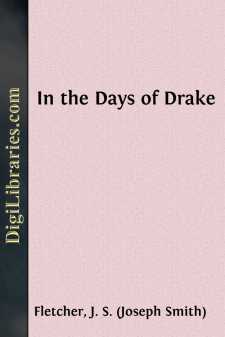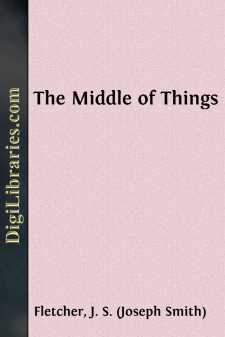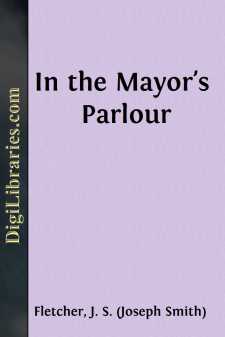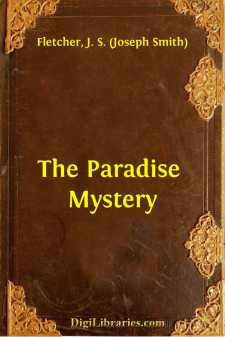Categories
- Antiques & Collectibles 13
- Architecture 36
- Art 48
- Bibles 22
- Biography & Autobiography 813
- Body, Mind & Spirit 142
- Business & Economics 28
- Children's Books 12
- Children's Fiction 9
- Computers 4
- Cooking 94
- Crafts & Hobbies 4
- Drama 346
- Education 46
- Family & Relationships 57
- Fiction 11828
- Games 19
- Gardening 17
- Health & Fitness 34
- History 1377
- House & Home 1
- Humor 147
- Juvenile Fiction 1873
- Juvenile Nonfiction 202
- Language Arts & Disciplines 88
- Law 16
- Literary Collections 686
- Literary Criticism 179
- Mathematics 13
- Medical 41
- Music 40
- Nature 179
- Non-Classifiable 1768
- Performing Arts 7
- Periodicals 1453
- Philosophy 64
- Photography 2
- Poetry 896
- Political Science 203
- Psychology 42
- Reference 154
- Religion 513
- Science 126
- Self-Help 84
- Social Science 81
- Sports & Recreation 34
- Study Aids 3
- Technology & Engineering 59
- Transportation 23
- Travel 463
- True Crime 29
J. S. (Joseph Smith) Fletcher
Joseph Smith Fletcher (1863-1935) was a British journalist and prolific author, best known for his detective fiction. Over his career, he penned more than 230 books, including novels, histories, and biographies, with a particular emphasis on crime and mystery. Fletcher's work, especially "The Middle Temple Murder," significantly contributed to the development of the detective genre in the early 20th century.
Author's Books:
Sort by:
CHAPTER I. OF MY HOME, FRIENDS, AND SURROUNDINGS. Now that I am an old man, and have some leisure, which formerly I did not enjoy, I am often minded to write down my memories of that surprising and remarkable adventure of mine, which began in the year 1578, and came to an end, by God’s mercy, two years later. There are more reasons than one why I should engage in this task. Every Christmas brings a...
more...
CHAPTER I THE ONE-EYED MAN The very beginning of this affair, which involved me, before I was aware of it, in as much villainy and wickedness as ever man heard of, was, of course, that spring evening, now ten years ago, whereon I looked out of my mother's front parlour window in the main street of Berwick-upon-Tweed and saw, standing right before the house, a man who had a black patch over his...
more...
CHAPTER I FACED WITH REALITY On that particular November evening, Viner, a young gentleman of means and leisure, who lived in a comfortable old house in Markendale Square, Bayswater, in company with his maiden aunt Miss Bethia Penkridge, had spent his after-dinner hours in a fashion which had become a habit. Miss Penkridge, a model housekeeper and an essentially worthy woman, whose whole day was given...
more...
THE MISSING BANK MANAGER Every Monday morning, when the clock of the old parish church in Scarnham Market-Place struck eight, Wallington Neale asked himself why on earth he had chosen to be a bank clerk. On all the other mornings of the week this question never occurred to him: on Sunday he never allowed a thought of the bank to cross his mind: from Sunday to Saturday he was firmly settled in the usual...
more...
CHAPTER I jacob herapath is missing This was the third week of Selwood’s secretaryship to Jacob Herapath. Herapath was a well-known man in London. He was a Member of Parliament, the owner of a sort of model estate of up-to-date flats, and something of a crank about such matters as ventilation, sanitation, and lighting. He himself, a bachelor, lived in one of the best houses in Portman Square; when he...
more...
IN THE MAYOR'S PARLOUR THE MAYOR'S PARLOUR Hathelsborough market-place lies in the middle of the town—a long, somewhat narrow parallelogram, enclosed on its longer side by old gabled houses; shut in on its western end by the massive bulk of the great parish church of St. Hathelswide, Virgin and Martyr, and at its eastern by the ancient walls and high roofs of its mediæval Moot Hall. The...
more...
CHAPTER I According to an entry in my book of engagements, I left London for Ravensdene Court on March 8th, 1912. Until about a fortnight earlier I had never heard of the place, but there was nothing remarkable in my ignorance of it, seeing that it stands on a remote part of the Northumbrian coast, and at least three hundred miles from my usual haunts. But then, towards the end of February, I received...
more...
CHAPTER ONE THE PRETTY PAWNBROKER On the southern edge of the populous parish of Paddington, in a parallelogram bounded by Oxford and Cambridge Terrace on the south, Praed Street on the north, and by Edgware Road on the east and Spring Street on the west, lies an assemblage of mean streets, the drab dulness of which forms a remarkable contrast to the pretentious architectural grandeurs of Sussex Square...
more...
CHAPTER I DEATH BRINGS OPPORTUNITY Linford Pratt, senior clerk to Eldrick & Pascoe, solicitors, of Barford, a young man who earnestly desired to get on in life, by hook or by crook, with no objection whatever to crookedness, so long as it could be performed in safety and secrecy, had once during one of his periodical visits to the town Reference Library, lighted on a maxim of that other...
more...
CHAPTER I. ONLY THE GUARDIAN American tourists, sure appreciators of all that is ancient and picturesque in England, invariably come to a halt, holding their breath in a sudden catch of wonder, as they pass through the half-ruinous gateway which admits to the Close of Wrychester. Nowhere else in England is there a fairer prospect of old-world peace. There before their eyes, set in the centre of a great...
more...











